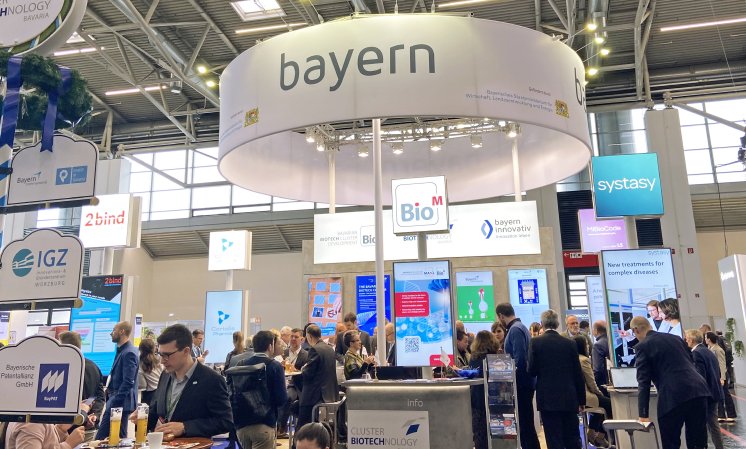- More than 30 Bavarian biotech companies present medical solutions
- Munich is a unique ecosystem for globally successful biotechnology
- AI and health data increasingly decisive factor for innovative developments
Bavarian biotech companies, from innovative start-ups to established small and medium-sized enterprises (SMEs), have proven to be leaders in the industry, not just during the COVID-19 pandemic. At the joint Bavarian booth at BIO-Europe 2023 in Munich, more than 30 of these companies presented pioneering solutions that have the potential to significantly shape the future of biotechnology. From novel therapeutic approaches against cancer to innovative approaches against antibiotic-resistant germs and revolutionary diagnostic technologies - the Bavarian biotech companies offered an impressive range of medical solutions.
Numerous industry representatives met in the state capital this year for Europe's most important biotech trade fair. With almost 6,000 participants from all over the world, BIO-Europe 2023 in Munich set a new registration record. This underlines the growing importance of the biotech industry and the relevance of this event for the global community of biotech experts.
Prof Ralf Huss, CEO of BioM, was delighted with the record attendance at BIO-Europe 2023 and the innovative solutions developed by Bavarian biotech companies: "As the local host, we are delighted that BIO-Europe is being held in Munich again after eight years. Biotechnology is a key driver of scientific progress and economic growth, and Bavaria has proven to be an important centre for this industry. We are proud to present these achievements at BIO-Europe 2023 and to make our sustainable contribution to global biotechnological development."
Dr. Ulrike Wolf, Director General at the Bavarian Ministry of Economic Affairs, said in her opening speech: "Bavaria offers an ideal breeding ground for entrepreneurial spirit and innovation. We want young, emerging companies to be able to develop their potential here and put innovative ideas into practice. That's why we support them with a diverse ecosystem that actively promotes research, financing opportunities and cooperation with established companies."
The press conference organized by BioM and MC Services on the topic of "AI and BigData: Pushing the Boundaries in Bavarian Biopharma" highlighted the importance of artificial intelligence and big data for medical research and ultimately the development of medical solutions. The discussion focused on the many opportunities that arise with the use of various digital technologies, both in image analysis and in the development of new drugs and diagnostics - but also the challenges such as data availability and quality as well as the necessary communication about the added value of health data for the benefit to society.
Dr. Franz Pfister, co-founder and CEO of the Munich-based start-up deepc, was delighted that the use of artificial intelligence has already become standard in medicine and sees great opportunities in it: "We see many great opportunities through the use of AI in healthcare in general and especially in the field of diagnostics, where we are active. We are making AI scalable and accessible to doctors and finally patients."
The innovative AI platform from deepc gives radiologists easy access to a large number of internationally leading and tested AI applications. The technology has already been used for two years at the Munich Oktoberfest in an AI-supported mobile computer tomograph to quickly and safely diagnose head injuries.
Tech giant Google, which is also based in Munich, is currently investing EUR 1 billion in data infrastructure to strengthen Germany as a business location. Representative Dr. Stefan Ebener, Head of Customer Engineering at Google Germany, made it clear that the use of AI can halve the development time of medical solutions and massively reduce costs. He explained: "We need collaborations with research and must educate the population and motivate them to move into this AI future."
In the panel discussion on the Munich ecosystem, speakers highlighted Munich's strengths in innovation: a supportive government, optimal infrastructure, a pool of qualified talent and significant investment. Advantages that major technology companies such as Google and Apple recognize by locating here. To successfully navigate the next stage of technological innovation, overcoming the challenges of funding incubation phases and facilitating clinical trials is necessary. To this end, collaboration between pharma, investors and accelerators such as BioM is crucial to succeed in Munich's dynamic environment.
With almost 6,000 participants and 3,000 companies from over 60 countries as well as almost 30,000 partnering meetings, BIO-Europe 2023 reflects the importance of the unique biotechnology ecosystem and its potential in Munich.
The next BIO-Europe will take place in Stockholm from November 4 to 6, 2024.

